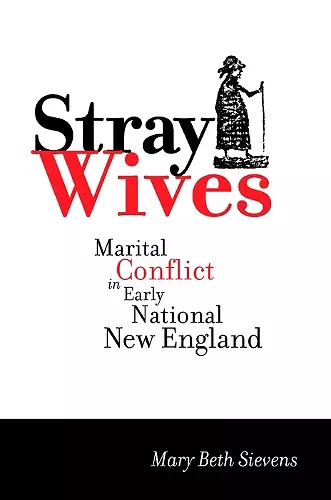Stray Wives
Marital Conflict in Early National New England
Format:Paperback
Publisher:New York University Press
Published:1st Mar '08
Currently unavailable, and unfortunately no date known when it will be back

Whereas my husband, Enoch Darling, has at sundry times used me in so improper and cruel a manner, as to destroy my happiness and endanger my life, and whereas he has not provided for me as a husband ought, but expended his time and money unadvisedly, at taverns . . . . I hereby notify the public that I am obliged to leave him.
Phebe Darling, January 13, 1796
Hundreds of provocative notices such as this one ran in New England newspapers between 1790 and 1830. These elopement notices--advertisements paid for by husbands and occasionally wives to announce their spouses' desertions as well as the personal details of their marital conflicts--testify to the difficulties that many couples experienced, and raise questions about the nature of the marital relationship in early national New England.
Stray Wives examines marriage, family, gender, and the law through the lens of these elopement notices. In conjunction with legal treatises, court records, and prescriptive literature, Mary Beth Sievens highlights the often tenuous relationships among marriage law, marital ideals, and lived experience in the early Republic, an era of exceptional cultural and economic change.
Elopement notices allowed couples to negotiate the meaning of these changes, through contests over issues such as gender roles, consumption, economic support, and property ownership. Sievens reveals the ambiguous, often contested nature of marital law, showing that husbands' superior status and wives' dependence were fluid and negotiable, subject to the differing interpretations of legal commentators, community members, and spouses themselves.
Sievens focuses on a rich and under-used source: the ads that appeared in early American newspapers alerting readers not to extend credit to run-away wives, as well as occasional replies made by wives themselves. This is a terrific source that illuminates marriage, gender, law, print culture, and community in early America. Sievens has shown considerable sensitivity and acuity, as well as diligence in the pre-digitized days, in her approach to these fascinating sources. This is an impressively lucid coverage resting on persuasive claims. . . . Indeed, this book, in its brevity, clarity, and inherent drama, may be of particular use in the classroom. A fine book on an important topic, it will certainly be of use to many working in this field. * Journal of Social History *
Offers an engaging look at marital conflict at a key transitional time in the emotional and economic landscape of early national New England. * Journal of the Early Republic *
Stray Wives is an insightful, carefully argued, and well-written work that complicates our understanding of law, society, and gender in early national New England. Along the way, it adds to our store of knowledge on such topics as women's economic role, domestic violence, and community relationships in early America. Sievens does a lovely job of showing the ways in which wives contested their husbands' dominance at the same time that they tolerated-indeed, sometimes benefited from-their own dependence. -- Anya Jabour,author of Marriage in the Early Republic
In Stray Wives, Sievens examines hundreds of desertion notices to elucidate how couples negotiated the common law of marriage by revealing the words they addressed to the public, the issues over which they disagreed, and their strategies for maneuvering through and settling their conflicts. This important book adds both detail and depth to our knowledge of marriage and marital conflict in the early republic. -- Merrill D. Smith,author of Breaking the Bonds
To fully appreciate how far women’s rights have evolved by the twenty-first century, all one need do is read a work like this one. . . . Highly recommended. * Choice *
Sievens shows how even when free of their marriages, women often remained dependent on male kin. * The Chronicle of Higher Education *
Wonderful. . . . A fascinating and complex account of husbands struggling to assert their legal dominance in a changing cultural landscape, while law remained static. . . . Stray Wives is full of creative research and compelling new insights about marriage in early national America. Sievens’s nuanced argument about power and interdependence within marriage is absolutely convincing. She also clearly demonstrates that legal change lagged behind cultural change, leaving husbands frustrated by their inability to rule. * William & Mary Quarterly *
ISBN: 9780814740651
Dimensions: unknown
Weight: unknown
171 pages